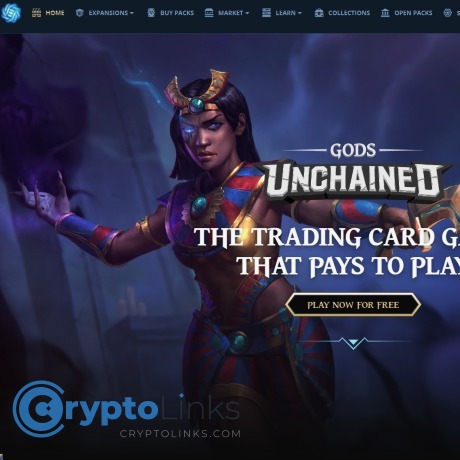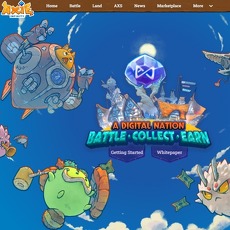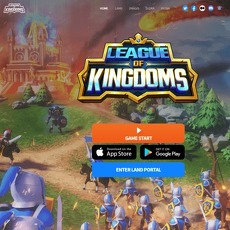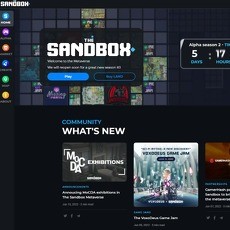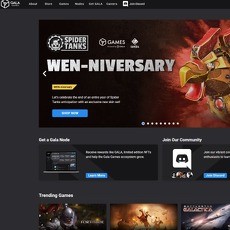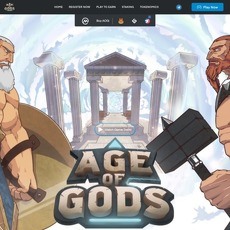Gods Unchained Review
Gods Unchained
godsunchained.com
Gods Unchained review
Gods Unchained is a new generation game that combines blockchain technology and a card game template for one of the most immersive gaming experiences. The goal is to build a gaming economy where the average player can purchase in-game assets and, in the process, acquire the necessary certification to own them outrightly. In essence, Gods Unchained offers the same array of functionalities that you will expect from a quality card game and also provides the tools that would ensure that players earn income.
In this guide, I will be exploring the workings of Gods Unchained, how to play it, and some of its downsides.
What is Gods Unchained?
As stated in the introduction, Gods Unchained is a card game and it shares some similarities with Magic: The Gathering Arena. So, this game hinges on players' tactical prowess during card games. The good thing is that Gods Unchained tries to level the playing field. Players are given a fair chance of winning since all new players are given the same set of cards. Therefore, it all boils down to the card battling skill of players rather than the cards in their possession. The icing on the cake is the incorporation of blockchain technology to power an open market wherein players can buy and sell cards.
Why is Gods Unchained a success?
Notably, blockchain games are fast becoming an appealing template for building games thanks to the effectiveness of the play-to-earn gaming model they operate. An average blockchain game has put the system in place to empower players with income-generating features. While this is a given, the implementation of a play-to-earn template does not necessarily translate to sustainable success, which is why many blockchain-powered games are struggling.
Apart from the monetary rewards of playing a game, players are also particular about the quality of the gameplay and how enjoyable it is to play if there were no promises of earning income. Notably, one of the common traits of successful decentralized games is their penchant for bringing familiar game elements that even mainstream gamers can resonate with.
The same is true for Gods Unchained, which has incorporated familiar themes and bolstered it with the possibility of earning income. This play-to-earn economy offers more dynamism which comes in the form of transferable and verifiable digital assets. Although the game itself does not exist on the blockchain, it has tokenized in-game assets designed, such that their owners can have full autonomy over how they are being used. Once you acquire the in-game assets on Gods Unchained, they are yours outrightly. This is unlike what we have on a majority of alternative games where the player can buy in-game assets but are not allowed to fully utilize them in the open market. At the end of the day, it is the company behind the game that takes all of the revenue generated from the trading of in-game assets.
Interestingly, it is not only the idea behind the hybrid game system that needs to be applauded. The process used to implement this system also plays a huge role. For one, the trading of the cards takes place on one of the sidechains (layer 2) of Ethereum to reduce the impact of the downsides of the Ethereum blockchain on the overall performance of the game. Ethereum’s layer 2 networks usually operate a blockchain ecosystem that is much more affordable for users. Those familiar with the network congestion crisis that often causes spikes in the transaction fees of the Ethereum blockchain would agree that a layer 2 implementation is the best option for a platform that intends on allowing users to trade NFTs. In summary, Gods Unchained’s success hinges on the effective integration of smooth and catchy gameplay with the play-to-earn model.
The team behind Gods Unchained
Looking at the intricacies of the gaming and blockchain elements put together to create Gods Unchained, it is safe to say that the team is experienced in delivering top-notch games and effective blockchain applications. As such, it comes as no surprise that the founders of Gods Unchained, James and Robbie Ferguson, have been active in the Ethereum developer community since 2015. Before their stint in the blockchain industry, the brothers had built a successful eCommerce solution among other businesses. However, as they began to get involved with the Ethereum ecosystem, they quickly changed their focus to blockchain gaming.
One of the brothers’ contributions to the Ethereum landscape is Immutable X, a layer 2 solution that allows the computation and storage of data off-chain. The goal is to provide blockchain applications and users with more efficient blockchain infrastructure. Unsurprisingly, Immutable X is the underlying infrastructure that powers Gods Unchained. Basically, this layer 2 solution makes it a lot easier and faster to trade the NFT-based in-game assets found on Gods Unchained.
Another key member of the team is Chris Clay, currently the game director of Gods Unchained Even before joining the team, Clay had amassed tons of experience in the game software development field. He served as the game director of Magic the Gathering: Arena. Hence, it is safe to say that Clay’s experience in the card trading niche must have helped shape the design direction of Gods Unchained.
How does Gods Unchained work?
Gods Unchained is a turn-based game that focuses on card-battling gameplay. More so, the game prides itself as a fair competitive platform where players can put their card battling strategy to test. Surprisingly, the game is free to play since new players are provided with 140 cards as part of the welcome package. With these basic decks of cards, a new player can begin to match up against other players or even square up with the computer. The good thing about this is that you get to collect more cards as you win. You can take advantage of the weekly tournaments and upgrade your decks of cards. The goal is to outsmart and defeat your opponents by building powerful decks and utilizing effective combat skills.
What is $GODS token?
Like most games, Gods Unchained has an in-game currency called $GODS. This is similar to the gold coin or credits that are used to purchase in-game items in traditional games. The only difference is that GODS is a cryptocurrency. Therefore, it can be exchanged for other cryptocurrencies or fiat currencies. This is unlike what we have in most conventional games whose in-game currencies do not have any financial value beyond their platform. It goes without saying that the $GODS token is critical to the play-to-earn model that Gods Unchained operates. Below are some of the things you can do with $GODS token:
Staking
One of the ways you can capitalize on the game's decentralized economy anchored by NFTs is to stake your GODS token. This is an ideal option for players that are ready to take part in governance initiatives while actively staking their coins. For their show of commitment towards the game’s economy, stakers receive rewards denominated in $GODS token. Likewise, active players who participate in game campaigns are eligible to receive staking rewards.
Minting
Recall that Gods Unchained incorporates NFT-based gameplays to enable a platform where players can easily monetize their winnings. Simply put, the game allows players to tokenize cards as NFTs, which will in turn ensure that they are transferable and verifiable. While this is a given, players need to spend $GODS to mint their cards as NFTs on Immutable X. Once these NFTs exist on the layer 2 network, they can then be traded on the marketplace.
Governance
Interestingly enough, it is not only the cards that players have control over. They can also have a stake in the day-to-day governance of the entire ecosystem as a whole, thanks to the implementation of a decentralized autonomous organization anchored by $GODS token. $GODS holders automatically earn the right to vote on policy updates and other governance-related issues. With $GODS token, players can jointly shape the future of Gods Unchained.
Payment method
Note that $GODS is the primary in-game currency of Gods Unchained. Hence, not only can it be used to mint NFT cards, but it can also be used to purchase in-game items on the marketplace. Simply put, $GODS token is the de-facto coin for settling all on-chain transactions.
How to play Gods Unchained
As mentioned earlier, Gods Unchained share some similarities to popular card games like Magic: The Gathering Arena and Hearthstone. As such, those familiar with these game titles will find it easier to understand the gameplay of Gods Unchained.
For each battle, you need a 30-card deck to go toe-to-toe with other players. The deck must showcase the power and theme of one of six gods. Note that this game is turn-based. Therefore, you and your opponent will take turns to play, with the goal of reducing the other players’ health to zero. One thing you should have at the back of your mind is that the cards in your possession are specifically designed with traits and capabilities with which you can defeat your opponents. You are expected to come up with a good strategy and determine the best moment to play each card to cause the most effective damage.
Notably, there are 3 types of cards including relics, spells, and creatures. Depending on the type of cards in your deck, you can initiate a variety of attacks and even boost your health and strength. That said, each play you make comes at a cost.
What is Mana?
Mana is the primary resource used during battles. You need to pay a particular amount in Mana to play each card on your deck and unleash special abilities called God powers. You are credited with Mana with each turn you take. The number of Mana you receive progressively increases by one with each turn up until the fifth turn. At your fifth turn, the accumulation of Mana decreases. For instance, you will receive one Mana for your first turn. By the second turn, the number of Mana you will receive will increase to two. The number of Mana you have will to an extent determine the type of card that you can play at each instance since there is a Mana cost associated with each card. Cards that cost more Mana tend to be more powerful and effective. As such, you have to accumulate enough Mana during the gameplay before you can use your powerful cards.
Each player starts the game with 30 health. The goal is to coordinate attacks such that the health stat of your opponent falls to zero before yours. One of the most important factors you need to consider is the strengths and weaknesses of your opponent’s deck of cards. This will help you make the best decision as to which collection of cards will be more effective against your opponent. You will find that taking weak cards to battle is usually detrimental to your chances of emerging as a winner.
What are the pros and cons of Gods Unchained?
The pros of Gods Unchained
It is based on a familiar card game theme
As highlighted in this guide, Gods Unchained is a card game that shares some similarities with existing and popular games. In essence, it is easy to understand the theme of the game and the gameplay itself. When trying to unravel the intricacies of Gods Unchained, players can rely on their experience with other card games. With this, the game is more enjoyable and less challenging to understand.
Gods Unchained implements a play-to-earn model
Part of the appeal of Gods Unchained is its play-to-earn model. Here, players get to have full control over the in-game assets they win or purchase. And so, they can easily exchange these digital assets for cryptocurrencies or fiat on the marketplace. With this system in place, Gods Unchained is not only offering you the bragging rights that come with outwitting other players but also providing you with a means of earning income while playing your favorite game.
It supports decentralized governance
Gods Unchained is one of the new generation blockchain games that incorporate a decentralized governance system. What this means is that the game supports a community-powered governance model since $GODS token holders can jointly decide on policy updates and the future of the game.
Gods Unchained attracts players in their numbers
You will agree that popularity is an important factor that can be used to judge the viability of games, particularly when they operate a player versus player template. There is a higher chance of finding players to battle against if the game is popular among gamers. In light of this, since players are instantly matched with opponents, it is safe to assume that Gods Unchained has a large and active user base.
It uses a layer 2 solution to optimize performance
Knowing fully well that Ethereum often suffers from network congestion, the team behind Gods Unchained has opted to execute on-chain transactions via a layer 2 solution. With this, the platform can process more card trades and even reduce transaction fees.
It is free-to-play
Another good thing about Gods Unchained is that you do not need to pay or buy specific in-game assets before you can begin to play the game.
The cons of Gods Unchained
Although there are certain aspects that Gods Unchained needs to improve upon, there was no specific thing we could pinpoint as potential downsides.
Conclusion
Gods Unchained redefines the trading card game genre by blending strategic, Hearthstone-like gameplay with blockchain technology, offering players true ownership of NFT-based cards and a play-to-earn economy. Its familiar mechanics, free-to-play model, and integration with Immutable X for low-cost, efficient transactions make it a standout for both casual gamers and crypto enthusiasts. Backed by an experienced team, including industry veterans from Magic: The Gathering, and a vibrant community, Gods Unchained delivers an engaging experience with real-world earning potential. While no major downsides stand out, staying mindful of Ethereum’s gas fees and market volatility is key.
Ready to explore Gods Unchained and other top blockchain games? Visit CryptoLinks.com for expert reviews, trusted resources, and the latest insights to level up your crypto gaming journey. Dive in now and discover the future of play-to-earn gaming!

